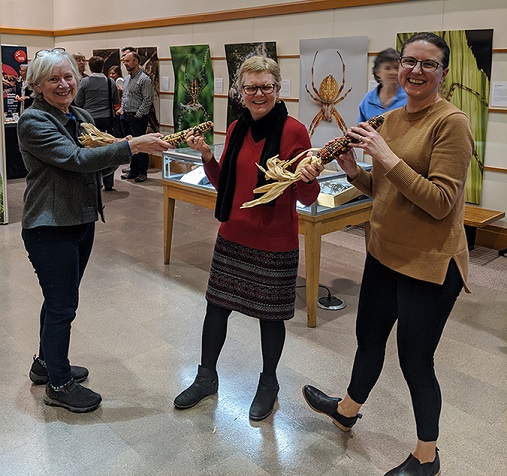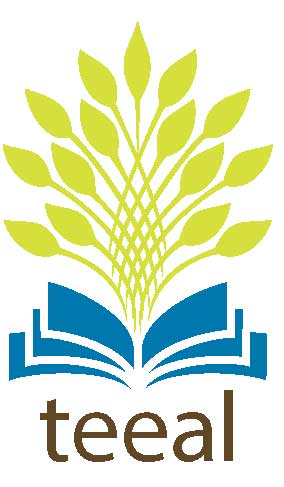
As some in the upper campus community may have already heard: There’s a new library director in town.
In late January, Cornell University Library welcomed Sara Wright as the Interim Director of Mann Library, following the retirement of Mary Ochs ’79, who led Mann Library from 2008 until January 2020. A January 27th reception celebrated Ochs’ many achievements and contributions to the Cornell University and global scholarly community, and in one of the numerous highlight moments of the occasion, Mann’s leadership torch — well, our bouquet of ceremonial corn — passed from Ochs to Wright to mark Mann’s newest dynamic transition.

Sara Wright is no stranger to Mann Library and the mission of land-grant scholarship at Cornell. Having earned a Master’s degree in Library and Information Science from Drexel University, Wright joined Mann Library’s staff in 2011 to manage the services offered to library patrons via the Stone Computing Classroom and other public computing facilities at Mann. In the following years, Sara assumed a number of other leadership positions in the Library, including Academic Technology Librarian, Head of User Services and Engagement, and Head of Learning, Spaces and Technology. Thanks to Sara’s stewardship in these roles, Mann has seen a number of important, widely acclaimed facilities and service improvements that have greatly enhanced the library’s learning spaces with new tools, state-of-the-art technology, and dynamic furnishings to support the wide variety of research needs and styles represented among the students and researchers who learn and work at Cornell today.
Of course, new leadership at Mann Library has some big shoes to fill. As the speakers at Mary Ochs’ retirement reception on January 27 made clear, Mary leaves a strong and lasting legacy at Mann Library and wider Cornell. Her leadership has advanced some critical progress in widening the accessibility of world class collections for researchers at Cornell and the world beyond, especially in the developing world. And under Mary’s encouraging watch, Mann took on a pioneering role in exciting new areas for academic libraries, such as the development and application of methodologies for the systematic review of already published research literature to help realize stronger returns on emergent research initiatives. As Kathryn Boor, Dean of the College of Agriculture and Life Sciences, summarized, over the course of her tenure as director of Mann Library, Mary Ochs proved herself a fearless leader in the Cornell community. And it’s no secret: In a time of rapid, near-constant change for libraries in the 21st century, fearlessness is indeed an invaluable quality for effective library management.
As Interim Director, Sara Wright will bridge the time until a new director of Mann Library is formally appointed. A national search to fill the position will begin shortly. Library and University stakeholders, including faculty of the College of Agriculture and Life Sciences and the College of Human Ecology will have an opportunity to meet and provide feedback about short-listed candidates. Any questions about the process may be directed to Search Committee members Danianne Mizzy (CUL Associate University Librarian / Search Committee Chair) and Ashley Shea, (Head of Instruction Services, Mann Library). It’s anticipated that an update on the results of the search process will be available in a few months time. And in the meantime, with Sara Wright at the helm, we can all also rest assured—Mann Library remains in excellent hands.





 They’ve been called our country’s best idea, a space to connect with each other and something bigger than ourselves, a remarkable expression of democracy, preserving for everybody and for all time some of the earth’s most breathtakingly beautiful wilderness. And this year our national parks are being celebrated for a major milestone: The 100th anniversary of the U.S. national park system.
Formally, the National Park Service came into being with legislation signed by President Woodrow Wilson on August 25, 1916. But the roots that nurtured the birth of the NPS reach much deeper into U.S. cultural history, fed by earlier legislation (such as the 1864 act signed by Abraham Lincoln to protect Yosemite Valley) and values and visions shaped by generations of thinkers, writers, scientists, and artists–James Fenimore Cooper, George Catlin, Ralph Waldo Emerson, John Muir, Ferdinand Hayden, Fredrick Law Olmsted, to name a few.
As with any big idea, the story of America’s national park system has many perspectives, some inspiring, some that conflict with each other, some that have yet to be told. A new summer book display at Mann Library puts a spotlight on this multi-faceted history. As the life sciences library at Cornell, Mann’s collection in the areas of conservation, natural resources, and park management is particularly strong. We invite you come browse and explore a little of the philosophies, social and political forces, struggles, achievements, and hard, slogging work that brought America’s national parks into being. In line with the National Park’s Service celebration theme this year, we hope the browse will inspire our audience to go “
They’ve been called our country’s best idea, a space to connect with each other and something bigger than ourselves, a remarkable expression of democracy, preserving for everybody and for all time some of the earth’s most breathtakingly beautiful wilderness. And this year our national parks are being celebrated for a major milestone: The 100th anniversary of the U.S. national park system.
Formally, the National Park Service came into being with legislation signed by President Woodrow Wilson on August 25, 1916. But the roots that nurtured the birth of the NPS reach much deeper into U.S. cultural history, fed by earlier legislation (such as the 1864 act signed by Abraham Lincoln to protect Yosemite Valley) and values and visions shaped by generations of thinkers, writers, scientists, and artists–James Fenimore Cooper, George Catlin, Ralph Waldo Emerson, John Muir, Ferdinand Hayden, Fredrick Law Olmsted, to name a few.
As with any big idea, the story of America’s national park system has many perspectives, some inspiring, some that conflict with each other, some that have yet to be told. A new summer book display at Mann Library puts a spotlight on this multi-faceted history. As the life sciences library at Cornell, Mann’s collection in the areas of conservation, natural resources, and park management is particularly strong. We invite you come browse and explore a little of the philosophies, social and political forces, struggles, achievements, and hard, slogging work that brought America’s national parks into being. In line with the National Park’s Service celebration theme this year, we hope the browse will inspire our audience to go “ As part of the
As part of the  September is
September is 
 Sarah Kennedy ’10 started at Mann in July as the Collection Development & Digital Collections Librarian. She coordinates the library’s book selection process (both print and electronic) and serves as the coordinator for liaison services to the New York State Agricultural Experiment Station community in Geneva, NY. Sarah is also the liaison to two departments (Entomology and Food Science). Sarah comes to us from the University of West Virginia, where she was the Agriculture, Natural Resources, Design, and Extension Librarian. Sarah’s net id is sek45.
Sarah Kennedy ’10 started at Mann in July as the Collection Development & Digital Collections Librarian. She coordinates the library’s book selection process (both print and electronic) and serves as the coordinator for liaison services to the New York State Agricultural Experiment Station community in Geneva, NY. Sarah is also the liaison to two departments (Entomology and Food Science). Sarah comes to us from the University of West Virginia, where she was the Agriculture, Natural Resources, Design, and Extension Librarian. Sarah’s net id is sek45. Kate Ghezzi-Kopel is the Applied Health Sciences Librarian at Albert R. Mann Library. She serves as liaison to the Cornell department of Human Development and the Division of Nutritional Sciences. Kate holds a B.A. in English from Ithaca College and a M.S. in Library and Information Sciences from Syracuse University. Her interests include health information literacy, systematic reviews, social media in libraries, and promotion of evidence-based research practices. Prior to joining Mann Library, Kate was Research Assistant at The Center for Bioethics and Humanities at SUNY Upstate Medical University and Intern at the SUNY Upstate Health Sciences Library. She also spent several years in academic publishing developing and acquiring content in the fields of biology, communication studies, mathematics, and clinical medicine. Kate’s net id is kwg37.
Kate Ghezzi-Kopel is the Applied Health Sciences Librarian at Albert R. Mann Library. She serves as liaison to the Cornell department of Human Development and the Division of Nutritional Sciences. Kate holds a B.A. in English from Ithaca College and a M.S. in Library and Information Sciences from Syracuse University. Her interests include health information literacy, systematic reviews, social media in libraries, and promotion of evidence-based research practices. Prior to joining Mann Library, Kate was Research Assistant at The Center for Bioethics and Humanities at SUNY Upstate Medical University and Intern at the SUNY Upstate Health Sciences Library. She also spent several years in academic publishing developing and acquiring content in the fields of biology, communication studies, mathematics, and clinical medicine. Kate’s net id is kwg37.
 Mary Lee “Mel” Jensen was hired as a part-time reference assistant at Mann Library. She has experience as the Head of Instructional Services and as an Assistant Professor at Kent State University. She was also the Instruction Coordinator at Lakeland Community College in Kirtland, Ohio. Mel will be working the front lines as a reference assistant where she will help manage reference desk operations, and help triage and answer the thousands of annual questions we get at the reference desk. Her hours will be 8:15am – 1:15pm, Monday through Friday. Mel’s NetID is mj533.
Mary Lee “Mel” Jensen was hired as a part-time reference assistant at Mann Library. She has experience as the Head of Instructional Services and as an Assistant Professor at Kent State University. She was also the Instruction Coordinator at Lakeland Community College in Kirtland, Ohio. Mel will be working the front lines as a reference assistant where she will help manage reference desk operations, and help triage and answer the thousands of annual questions we get at the reference desk. Her hours will be 8:15am – 1:15pm, Monday through Friday. Mel’s NetID is mj533. Megan Benson started as another new part-time reference assistant In July. Before coming to Mann, Megan worked in the Orange County Library System in Orlando Florida, and as an Adjunct Professor at Valencia College in Orlando. Megan will also be helping to manage reference desk operations, and helping to triage and answer our volumes of reference questions. Her hours will be 12:00 – 5:00pm, Monday through Friday. Megan’s NetID is mlb459.
Megan Benson started as another new part-time reference assistant In July. Before coming to Mann, Megan worked in the Orange County Library System in Orlando Florida, and as an Adjunct Professor at Valencia College in Orlando. Megan will also be helping to manage reference desk operations, and helping to triage and answer our volumes of reference questions. Her hours will be 12:00 – 5:00pm, Monday through Friday. Megan’s NetID is mlb459. Deborah Cooper joined Mann’s Collection Development department as our new Collections Specialist on September 29th. Deborah comes to us from Digital Scholarship and Preservation Services (DSPS) in Olin where she has worked on the arXiv repository team. Previously she worked at the SUNY Cortland Memorial Library where she had reference and collection development duties. She also has Special Collections experience from an internship at the Rakow Library at the Corning Museum of Glass and has done volunteer archival work for Historic Ithaca. Deborah earned an MLIS from San José State University and has a BA in History from Leeds University, U.K. Her net id is dsc255.
Deborah Cooper joined Mann’s Collection Development department as our new Collections Specialist on September 29th. Deborah comes to us from Digital Scholarship and Preservation Services (DSPS) in Olin where she has worked on the arXiv repository team. Previously she worked at the SUNY Cortland Memorial Library where she had reference and collection development duties. She also has Special Collections experience from an internship at the Rakow Library at the Corning Museum of Glass and has done volunteer archival work for Historic Ithaca. Deborah earned an MLIS from San José State University and has a BA in History from Leeds University, U.K. Her net id is dsc255. This coming spring semester, Mann librarian Sarah J. Wright will again collaborate with the Office of Undergraduate Biology to offer BIOG 3020: Seminar in Research Skills for Life Sciences.
This coming spring semester, Mann librarian Sarah J. Wright will again collaborate with the Office of Undergraduate Biology to offer BIOG 3020: Seminar in Research Skills for Life Sciences. It’s Cornell winter break and the campus is settling into some deep winter quiet. Too quiet for you? Wondering how you might be able to fill your time until the start of the spring semester? Please allow us to name you a few ways Mann can help you with that:
It’s Cornell winter break and the campus is settling into some deep winter quiet. Too quiet for you? Wondering how you might be able to fill your time until the start of the spring semester? Please allow us to name you a few ways Mann can help you with that: Picture this: You’re working on a systematic review or literature search and you’ve come up with 1,000+ citations. Great! But now what? It takes time to read and select relevant articles, coordinate decision making with your collaborators, and organize your results. When you’re doing a review, this article-screening process can quickly become a daunting task.
Picture this: You’re working on a systematic review or literature search and you’ve come up with 1,000+ citations. Great! But now what? It takes time to read and select relevant articles, coordinate decision making with your collaborators, and organize your results. When you’re doing a review, this article-screening process can quickly become a daunting task.